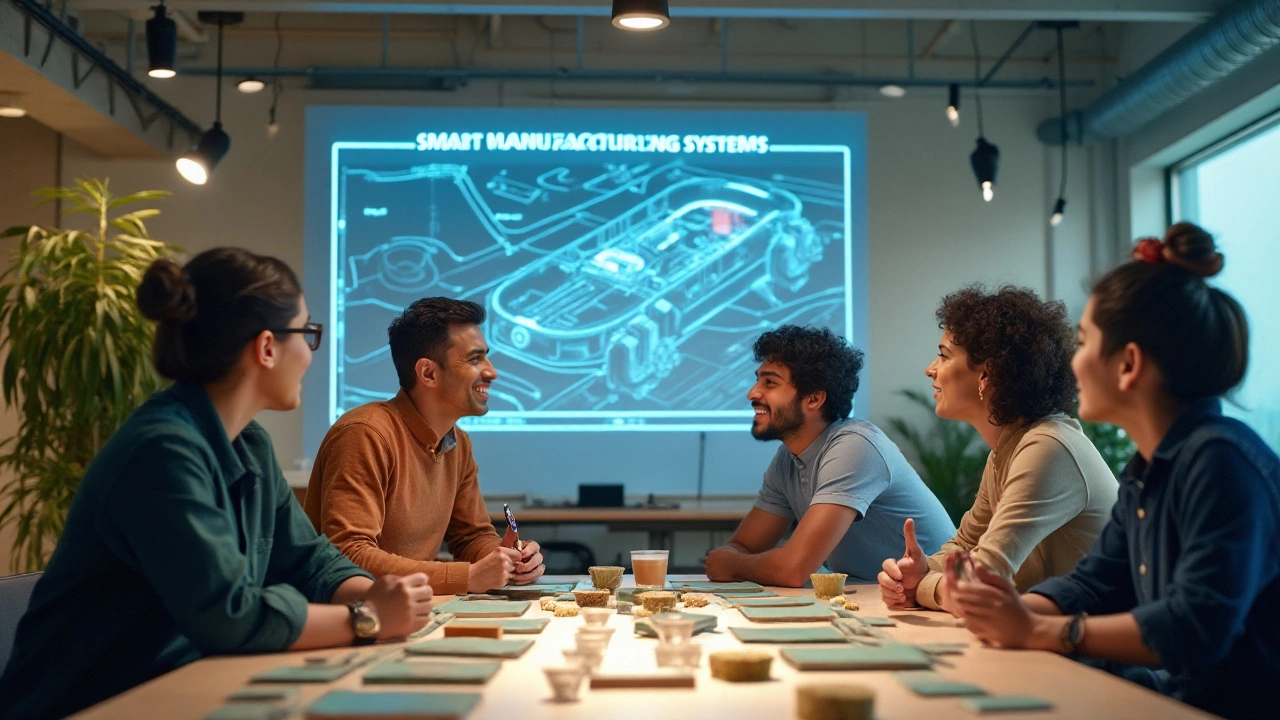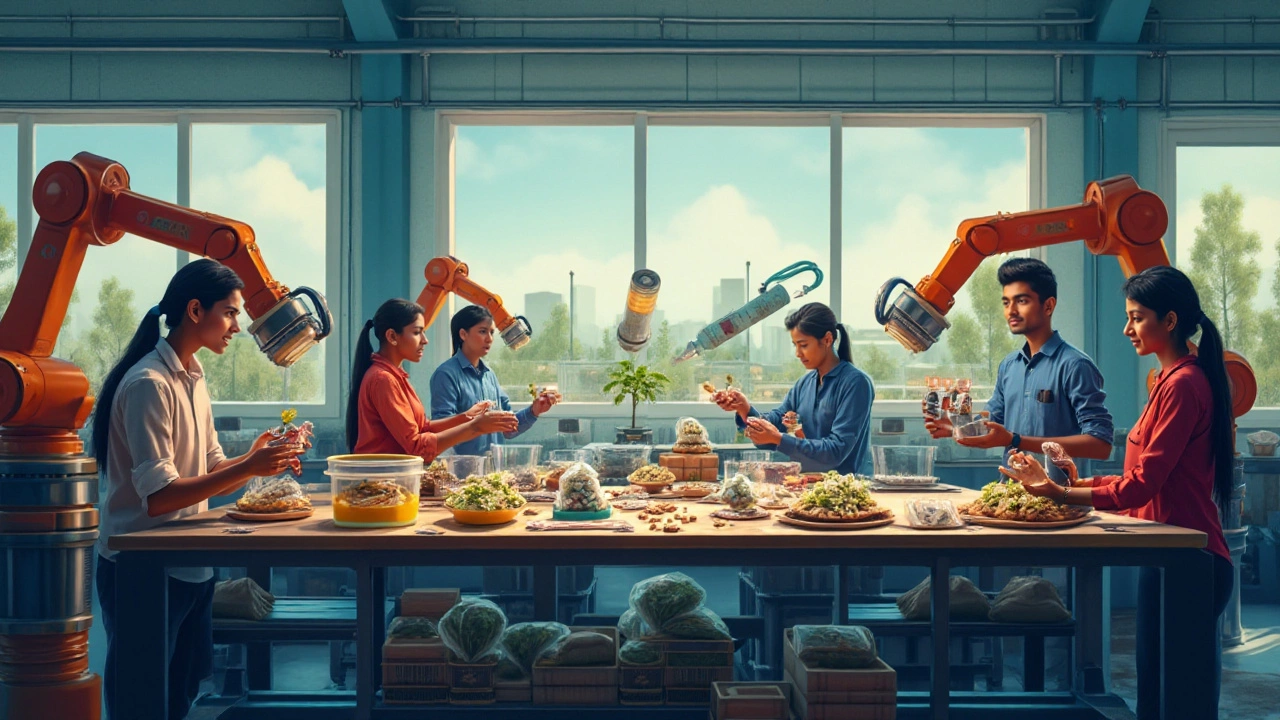As we navigate through 2025, it's fascinating to witness the dynamic shift taking place in the manufacturing sector. Startups are breathing new life into this industry by embracing cutting-edge technologies and environmental consciousness. This isn't just about creating products faster and cheaper; today's entrepreneurs are doing something different. They're marrying innovation with responsibility, aiming for profits alongside a positive social impact.
Several sectors within manufacturing are standing out, attracting the mavericks who are ready to challenge the status quo. With an eye on sustainability and efficiency, these startups are tapping into consumer trends that veer towards customization and eco-friendly solutions. As we explore these burgeoning niches, the opportunities for creative and ambitious entrepreneurs are limitless. It's a thrilling time to be part of this growing community that is reshaping how we think about production and consumption.
- Tech-Driven Manufacturing Innovations
- Sustainability: The Green Machine
- Local Production Resurgence
- Customized Manufacturing Solutions
- Navigating Market Demands
Tech-Driven Manufacturing Innovations
The technological revolution in manufacturing startups is not just a fleeting trend; it's a seismic shift transforming the entire sector. Ever since the inception of Industry 4.0, companies have been diving deep into digitalization, weaving new patterns into the traditional tapestry of manufacturing processes. The tangible outcomes are fascinating: increased automation, reduced waste, better quality control, and of course, swift production times. Robots, AI, and IoT devices have become the new craftsmen, guiding factories into an era of unprecedented precision and efficiency.
One of the most exciting developments is the adoption of smart manufacturing, where machine learning and predictive analytics play crucial roles in decision-making processes. Imagine sensors and data analytics working in tandem to predict equipment failures before they happen, drastically reducing downtime and maintenance costs. Beyond that, 3D printing has moved beyond novelty status, proving invaluable in prototyping and mass customization. From creating intricate components for aerospace applications to producing complex medical devices tailored to individual needs, the possibilities are endless.
According to a report by McKinsey & Company, smart manufacturing could contribute up to $3.7 trillion in value by 2025. This is primarily due to the enhanced efficiencies brought by data-driven decisions. Tech-savvy startups are leading the charge by developing platforms that integrate these technologies seamlessly into legacy systems. It's not all smooth sailing, though. Challenges such as data security, integration complexities, and high initial costs remain hurdles. Nonetheless, the potential benefits overshadow these obstacles, encouraging industries to innovate continuously.
"The future of manufacturing lies in technology, but its success depends on how well companies integrate these tools into their operations," said a senior analyst at Gartner.
Moreover, as more businesses understand the advantages of acceleration through technology, there is a growing demand for skilled professionals who can bridge the knowledge gap. This creates a whole new market for educational startups focused on upskilling existing workforces and training new talent. Startups in this niche could serve as significant catalysts in this revolution.
Case Studies and Applications
Let's look at some concrete examples of thriving tech-driven manufacturing innovations. Siemens' MindSphere, a cloud-based IoT operating system, is transforming manufacturing by allowing businesses to connect their products, plants, and systems. Another player, General Electric's Predix, offers a similar ecosystem for industrial applications. These solutions exemplify how digital twins—a digital replica of physical entities—can predict issues, optimize operations, and speed up production lines. The results? Improved output quality, increased resource efficiency, and immense cost savings.
Sustainability: The Green Machine
The term 'going green' transcends mere trendiness in 2025, evolving into a fundamental ethos at the heart of modern manufacturing. At the core of this evolution is the pursuit of sustainability—a journey driven not just by idealism but by market demand and regulatory pressures as well. The impact of environmental considerations on manufacturing startups is immense, especially with consumers increasingly leaning towards eco-friendly products.
One of the key drivers in this area is the reduction of carbon footprints. Manufacturing startups are exploring renewable energy sources, from solar panels to wind turbines, creating hybrid energy solutions. This shift isn’t just about ethics; it’s a financial decision too, as renewable energy reduces operational costs in the long term. Notably, statistics have shown that companies with robust environmental, social, and governance strategies often experience higher profitability and market valuations. The benefits are manifold: a cleaner planet, cost savings, and a strong brand reputation.
"Sustainability is no longer about doing less harm. It's about doing more good," says Jochen Zeitz, the CEO of Harley Davidson and a notable advocate of sustainable business practices.
Another significant aspect of the green revolution in manufacturing is the focus on using biodegradable and recycled materials. Plastics made from plant-based sources like corn and sugarcane are being used in new ways, and recycling processes have become more intricate and effective than ever before. This move towards sustainable materials is supported by policies looking to combat waste and pollution.
The rise of circular economy principles has introduced the concept of designing products for second life. This involves creating items with the foresight that they can be disassembled and reused, benefiting both businesses and consumers while contributing positively to the planet. Startups are utilizing advanced technologies, such as AI-driven supply chain optimization, to minimize waste across the board. These tech-driven solutions allow for real-time adjustments and improved resource allocation.
Let’s not forget the importance of community and collaboration. Manufacturing companies are teaming up with non-profits and governmental entities to co-create innovative technologies and sustainable processes. Stakeholder engagement is crucial to spearheading a collective response to environmental challenges. As industry innovations continue to grow, partnerships are pivotal in scaling sustainable solutions across the globe. With these concerted efforts, manufacturing not only survives but thrives in today’s ecological landscape.

Local Production Resurgence
In 2025, the concept of local production is experiencing a spectacular comeback, weaving its way into the mainstream narrative of the manufacturing industry. The allure of local production lies in its ability to foster community, reduce environmental impact, and offer consumers something unique and authentically close to home. People have realized the intrinsic value of supporting local entrepreneurs, spurred by the pandemic-induced supply chain disruptions of previous years which highlighted vulnerabilities in global logistics networks. By nurturing local manufacturing, regions not only enhance economic resilience but also cultivate a sense of pride and cultural continuity.
Several cities have become vibrant ecosystems for manufacturing startups. Take Austin, for instance, where tech-savvy innovators are integrating traditional crafts with modern technology, producing everything from artisan soaps to smart home devices. On the other coast, Portland’s scene thrives on sustainability with startups prioritizing products made from recycled materials sourced locally. The shift toward local production taps into the consumer's growing craving for transparency and traceability in the products they purchase. As more people ask, "Where was this made?" startups are readily answering with pride, "Right here."
There are critical benefits extending beyond just a catchy label. Local production reduces the carbon footprint compared to overseas manufacturing due to shorter transportation routes. It’s one of the reasons experts from the Green Innovation Council advocate for local over global.
"The future of sustainable development rests widely on regional manufacturing," says Dr. Emily Hayes, renowned environmental economist. "By keeping production local, we not only support community growth but also make significant strides toward global emission reduction goals."This perspective is one of the many driving factors prompting regions to offer grants and incentives to newly established startups, encouraging them to set roots locally.
The move to bring manufacturing jobs back home is supported by technological advances like 3D printing and automation, making small-scale local production not only possible but viable. Automation technologies allow small businesses to compete with global giants, efficiently producing goods without compromising quality or cost. Consider the textile industry, where firms are using advanced robotics to weave and cut fabrics with precision that was once only possible in large factories. There's an ongoing revolution in customization too. **Consumers** relish products tailored to their needs and tastes and local producers are adept at meeting these demands due to their agility and proximity. This capability offers startups a competitive edge, leading to customer loyalty and business expansion.
In addition to the financial and environmental benefits, the cultural impact of local production cannot be underestimated. Products now tell stories—stories of the hands that crafted them and the place they originate from. There’s a palpable excitement around discovering and celebrating these homegrown stories. It’s as much about the journey of the product as it is about its final quality. For entrepreneurs considering entering this sphere, the time is ripe. Joining local markets or craft fairs could be an initial step to gauging community interests while building brand presence. For those with a flair for storytelling and a passion for craftsmanship, local manufacturing offers a fulfilling path that aligns profit with purpose in the most tangible way.
Customized Manufacturing Solutions
In today's fast-paced world, the desire for personalized experiences extends beyond services and digital content, infiltrating the realm of tangible products. Consumers are increasingly demanding items tailored to their unique tastes and needs, and this shift is driving growth in customized manufacturing solutions. Brands are realizing that a one-size-fits-all approach can no longer keep pace with consumer expectations, sparking a myriad of opportunities for manufacturing startups to thrive in this niche. By integrating advanced technologies such as 3D printing, AI-driven design, and customer-centric platforms, emerging companies are revolutionizing the way products are conceived, produced, and delivered.
The advantages of these solutions are multifaceted. For the entrepreneur, customized manufacturing not only means staying ahead of the competition but also aligns with current industry trends favoring sustainability and reducing waste. By producing only what is necessary, these businesses minimize excess inventory, contributing positively to environmental conservation. Customers, on the other hand, benefit from products that truly resonate with their individual preferences, enhancing satisfaction and loyalty. A telling example of this trend can be seen in the fashion industry’s shift. Modern consumers seek garments that reflect their personal style and fit like a glove, and some startups are rising to the challenge by incorporating body-scanning technologies to enhance personalized fittings.
"Customization is the ultimate form of luxury. In a market saturated with choices, personalized products offer a unique selling proposition that transcends mere transactional relationships,” remarks Jill Standish, a retail expert from a leading consultancy firm.As if by design, tech-savvy millennials and Gen Z consumers, who are known for valuing individuality, are driving this demand. But it's not just about novelty; customized solutions can provide practical benefits too. For instance, in the electronics sector, personalized gadgets are being tailored to individual ergonomic needs, maximizing comfort and usability.
However, the process isn’t without its challenges. Personalized production can be more resource-intensive, requiring sophisticated technology and a deft logistical process. Startups entering this field need to innovate continuously and embrace a lean mindset to remain agile and responsive. Moreover, ensuring seamless integration across the different stages—from design to delivery—is crucial for maintaining customer satisfaction and operational efficiency. A strategic emphasis on customer feedback can guide ongoing product improvements and service enhancements. By doing so, manufacturing startups position themselves as pioneers in an otherwise traditional industry. This kind of innovation not only fuels profitability but also plays a critical role in strengthening the brand’s market positioning.

Navigating Market Demands
When diving into the world of manufacturing startups, understanding and meeting market demands is crucial. Today's consumer is more informed and more environmentally conscious than ever before, and this shift has redefined market demands. Manufacturers must now cater to an audience that values sustainability, affordability, and innovation. The modern-day consumer isn't just looking for a product; they're seeking products that speak to their values and fit their lifestyles. Meeting these demands often requires a delicate balance of creativity and practicality. Startups must analyze market trends, consumer preferences, and the competitive landscape continuously to stay ahead.
One major trend propelling manufacturing startups is customization. Consumers no longer want generic products; they want items tailored to their tastes and needs. This demand for customized manufacturing solutions has given rise to various business opportunities in industries ranging from fashion to electronics. Technologies such as 3D printing have made it easier for startups to offer customization without massive overhead costs. In fact, a McKinsey report highlighted that “77% of consumers are willing to pay more for personalized experiences or products.” This statistic demonstrates the financial benefits that can arise from aligning with consumer desires.
Startups that succeed in navigating market demands often incorporate technology to streamline operations and enhance the customer experience. It's about creating a seamless journey from initial contact to final product delivery. For instance, smart manufacturing systems can integrate real-time data analysis to predict consumer behavior and promptly adjust production processes. This technological synergy enables startups to remain flexible and responsive, which is essential in a rapidly evolving market.
“The ability to fully align product offerings with consumer preferences is no longer a luxury but a necessity for emerging manufacturing startups,” says industry analyst Rebecca Howard. This sentiment encapsulates the growing importance of staying attuned to customer needs in today's manufacturing landscape.
Additionally, market demands for sustainable products have put pressure on manufacturers to innovate while respecting environmental concerns. Startups are increasingly investing in green technologies, sustainable materials, and eco-friendly procedures. This not only resonates with an eco-conscious consumer base but also aligns with global initiatives for environmental responsibility. Such approaches can lead to a competitive advantage, as more consumers prefer to purchase from brands that demonstrate a commitment to sustainability.
The challenge for manufacturing startups lies in maintaining high-quality standards while meeting these diverse market demands. Quality assurance processes are evolving to ensure products meet regulatory standards without compromising on consumer expectations. Smart quality control systems, often powered by AI, are being incorporated to detect defects and maintain product integrity. These measures are vital as they safeguard a brand’s reputation while delivering on promises of excellence and sustainability.
Understanding the dynamics of market demands in manufacturing is an ongoing process. Startups must be vigilant, adaptive, and innovative to thrive. As we look into the future, those who navigate these demands thoughtfully and creatively will undoubtedly carve a niche for themselves in the competitive world of manufacturing. Engaging with the audience, listening to their feedback, and adapting quickly are keys to not just surviving but flourishing in the industry.
